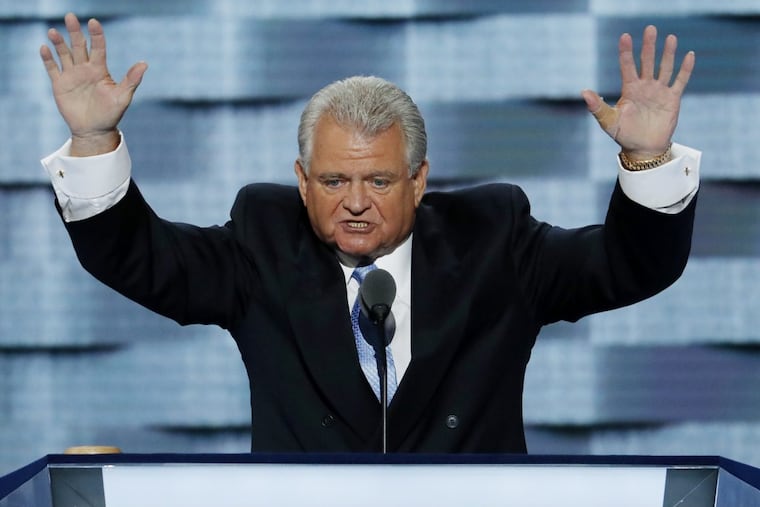U.S. Rep. Bob Brady's emails searched as FBI probe nears critical point
In a Nov. 1 search warrant affidavit for Brady's bobcongress@aol.com account, authorities - in their clearest language to date - allege Brady led a conspiracy to hide what they describe as an illegal campaign contribution and lay out the potential charges he might face - a list that includes wire fraud, lying to the FBI and conspiracy.

In their clearest language to date, federal authorities have accused U.S. Rep. Robert Brady of leading a criminal conspiracy to hide a $90,000 payment they say he made to persuade a 2012 primary opponent to drop out of the race, newly unsealed court records show.
The claim – tucked into a Nov. 1 search warrant affidavit unsealed Friday – alleges the congressman was an active participant in a scheme that has already elicited a guilty plea from Brady's one-time challenger, former Philadelphia Municipal Court Judge Jimmie Moore, and led to indictments against Brady aides Ken Smukler and Donald "D.A." Jones.
Agents and prosecutors filed the affidavit to persuade a judge to approve a search of bobcongress@aol.com, a personal email account used by Brady. It also lays out the potential charges that Brady might face should he be indicted – a list that includes wire fraud, lying to the FBI and making an illegal campaign contribution.
"The investigation has uncovered evidence which indicates that Brady, Smukler and Jones utilized Smukler's and D.A. Jones' corporations to conceal payments from Brady's campaign … for Moore to withdraw from the 2012 Democratic primary race," FBI Special Agent Jonathan R. Szeliga wrote.
Still, it remains unclear if the unsealing of the affidavit indicates the probe is heating up or winding down — and if one of the state's longest-serving members of Congress and chairman of the city's powerful Democratic City Committee will be charged.
Many of the allegations lodged in the affidavit – which was first reported Tuesday by Seamus Hughes, deputy director of the Program on Extremism at George Washington University — have been publicly known since the investigation burst into public view this summer.
In asking the judge to unseal the affidavit last week – along with similar warrants filed for email accounts associated with Moore, Smukler and Jones – Assistant U.S. Attorney Eric L. Gibson said that need for secrecy is no longer necessary.
"The sealing aimed to protect the ongoing criminal investigation," he wrote in a motion filed Thursday. "Some of the bases for the application to seal are no longer existent."
What's more, prosecutors are working against a clock.
Since April, Brady has signed several agreements with authorities extending the statute of limitations for any alleged crimes he may have committed, according to sources familiar with the agreement but not authorized to publicly discuss it. Such a move gives prosecutors more time to investigate but also his lawyers more time to convince the Justice Department their client did nothing wrong. The most recent agreement is set to expire this week if he does not agree to another extension.
Approached Tuesday afternoon at City Hall, Brady declined to answer questions about the newly unsealed document.
His lawyer, Jim Eisenhower, said Tuesday that the warrant sought "documents that the congressman already provided" to investigators months ago. "The congressman is not a target and he did nothing wrong," Eisenhower added.
And yet, the unsealed warrant indicates that agents took steps to continue their probe by accessing Brady's emails after Smukler and Jones were charged last month with conspiracy and illegal campaign donations, an indictment the congressman's supporters hoped would be the end of the case.
In the affidavit, Szeliga, the FBI agent, writes that investigators hope to use Brady's emails to debunk his claims that much of the money he paid Moore in 2012 was not a payoff but payment meant to lock down exclusive rights to polling data that the judge had commissioned during his brief race.
Prosecutors have previously balked at that claim, arguing that Brady already had access to the data after a campaign operative slipped it to him six months earlier.
The search warrant affidavit expounds on that argument. According to the document, it was Philadelphia campaign consultant Gregg Kravitz who first passed the polling data to Brady. He told agents that neither Brady nor any of his campaign aides ever asked him not to share the same data with anyone else, the affidavit states. (Kravitz could not be reached for comment late Tuesday.)
"The government intends to introduce evidence that Brady took no steps between December 2011, when he first learned of the poll's existence, and June 2012 to prevent dissemination of the poll or obtain exclusive ownership of the poll," it says.
Szeliga's document also challenges several other claims Brady has made throughout the investigation – including that he knew little about the details of the transaction, which was mostly overseen by Smukler.
In the filing, FBI agents cite an email they obtained from Smukler's accounts that suggests Brady provided the campaign consultant with contact information for Moore's campaign manager, Carolyn Cavaness, whose consulting firm was paid $25,000 that she has admitted was later passed on to Moore.
That money, according to campaign finance records, came from Brady's campaign coffers and was passed through a consulting firm owned by Jones, the indicted Brady aide, before it was paid to Cavaness' company.
Yet Brady, according to the search warrant affidavit, told FBI agents in an April interview that he never used Jones' company as a pass-through. He also denied having Moore's polling data in his possession prior to his campaign's payments to the judge – a claim authorities now allege was a lie, according to the document.
Both Smukler and Jones have denied any wrongdoing and vowed to take their cases to trial.
Moore and Cavaness pleaded guilty to falsifying campaign records and are cooperating with the investigation.
Staff writer Andrew Seidman contributed to this report.